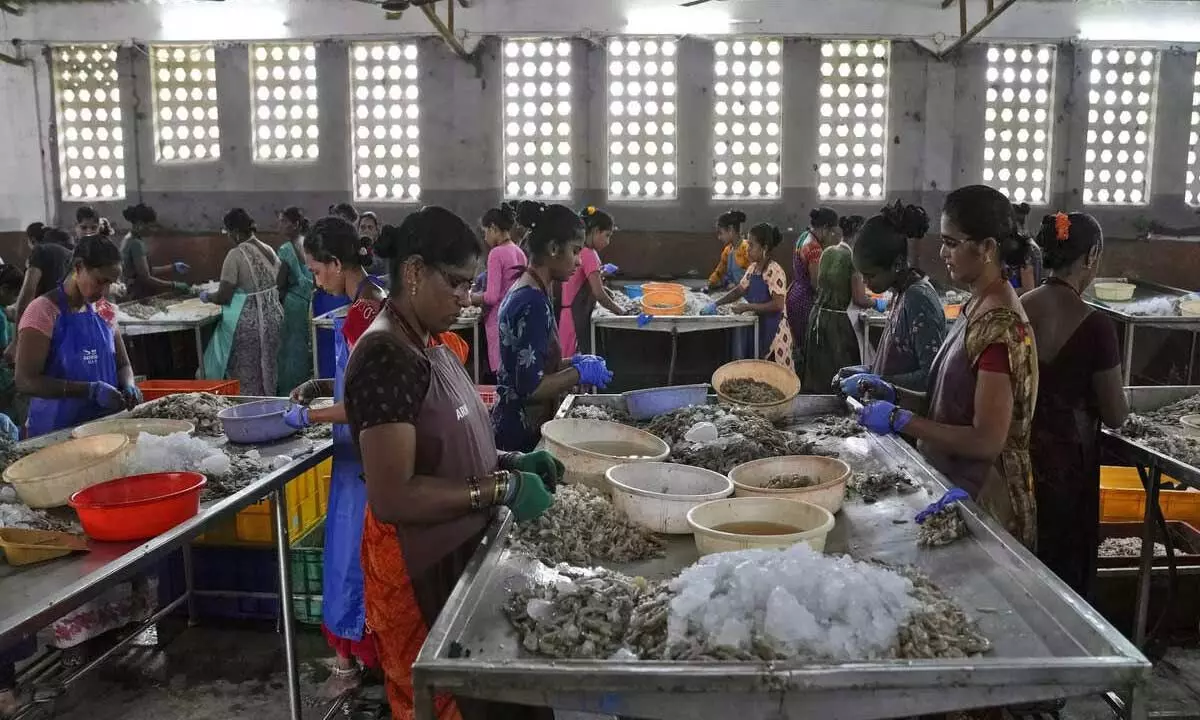India has robust regulatory, safety framework for seafood units: Commerce min
Share :

India has a robust regulatory framework for its 548 seafood units and it has set up world-class facilities in the fish processing sector, which are regularly inspected and monitored by various government agencies, the commerce ministry said on Saturday.
New Delhi: India has a robust regulatory framework for its 548 seafood units and it has set up world-class facilities in the fish processing sector, which are regularly inspected and monitored by various government agencies, the commerce ministry said on Saturday.
The statement comes in the backdrop of some reports alleging food safety and bad labour conditions in the Indian shrimp industry. It said that all its units are registered with MPEDA (Marine Products Export Development Authority) and FSSAI (Food Safety and Standards Authority of India) and approved by EIC (export inspection council) as mandated by the law. Additionally, 46 independent pre-processing units are registered by the authority. The shrimp hatcheries and aquaculture farms are registered with the Coastal Aquaculture Authority (CAA) and State Fisheries Departments based on their respective locations. MPEDA also enrols aquafarms to bolster the traceability system of aquaculture products and adhere to national and international regulatory provisions, including Seafood Import Monitoring Programme (SIMP) of the US.
"The production and processing systems are regularly monitored by regulatory agencies in India and are subjected to audits by inspectors of the US FDA (Food and Drug Administration), European Commission, GAC of China, Export Inspection Agency, MPEDA, etc., in addition to scores of private and certification audits," it said. It added that the pre-processing and processing units follow a HACCP (Hazard Analysis and Critical Control Point)-based food safety management system as per the US Code of Federal Regulations. It also said that to promote safety of products, the usage of pharmacologically active substances has been banned in aquaculture since 2002.
The national regulations and monitoring measures such as the National Residue Control Plan, ELISA screening labs, in-house labs, and pre-export checks ensure that the food safety hazards, including antibiotic residues, do not enter the product value chain and pose any consumer health risk. "The inter-departmental task forces in states monitor hatcheries, farms, aquaculture input shops and feed mills and punish the violators to curtail the sale and usage of unauthorized inputs, including banned antibiotics in the aquaculture sector," it added. The ministry said that measures have been taken to impose a ban on the usage of the two antibiotics Chloramphenicol and Nitrofuran in all food-producing animal systems. MPEDA has also initiated a certification scheme, 'Shaphari', for the production of quality produce. The ministry said that to maintain excellent levels of hygiene and safety, all the technicians and workers in the pre-processing and processing units, along with the farmers, technicians, and workers in hatcheries and farms, receive extensive training on sanitary practices, food safety hazards, and good management practices.
These training programmes are conducted by various agencies, including MPEDA, EIAs (export inspection agencies), NaCSA (National Centre for Sustainable Aquaculture), state departments, and ICAR (Indian Council of Agricultural Research) institutes, underscoring the commitment to the welfare of the workers and the quality of the products. Further, it said that any entity engaged in business activity is licensed by the local governing body and is obliged to follow the labour welfare laws prescribed by the Union and state governments. "The seafood pre-processing and processing units maintain all records related to processing, quality checks, employee training, and other requirements of the applicable regulations and rules," it said, adding that they periodically provide the services of a registered medical practitioner to address workers' health issues. It added that the State Labour Department regularly monitors the activities of both organised and unorganised sectors involved in aquaculture and fish processing. "It takes appropriate action to protect the interest and welfare of the labourers. India is steadfast in its commitment to producing quality seafood products free from health hazards," the ministry said. This commitment is upheld through the adoption of sustainable practices to meet domestic and international market demand, it said, adding, India has also established world-class facilities in the fish processing sector, which are regularly inspected and monitored by various government agencies. "We strongly refute the allegations levelled against the Indian shrimp farming and processing sector," it said. India achieved record exports of seafood both in terms of volume and value (both USD and Rupee) by shipping 17,35,286 tonnes of seafood worth Rs 63,969.14 crore (USD 8.09 billion) during the 2022-23 fiscal. During FY23, the export improved in quantity terms by 26.73 per cent, in rupee terms by 11.08 per cent, in USD terms by 4.31 per cent. Frozen shrimp remained the major export item in terms of both quantity and value while the US and China turned out to be the major importers of India's seafood. Frozen shrimp, which earned Rs 43,135.58 crore (USD 5,481.63 million), retained its position as the most significant item in the basket of seafood exports. Frozen shrimp accounted for a share of 40.98 per cent in quantity and 67.72 per cent of the total USD earnings. The overall export of frozen shrimps during 2022-23 was pegged at 7,11,099 tonnes. The US imported 2,75,662 tonnes of frozen shrimp, followed by China at 1,45,743 tonnes. PTI RR














